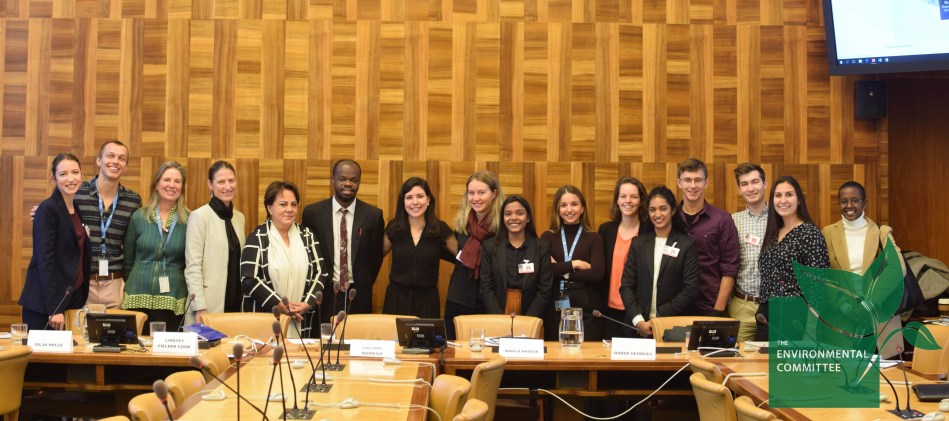Peace Week’s Climate Justice and Peacebuilding Event
By Claire Ransom
There were emails, there were Facebook notifications and there were class announcements made. The ‘Climate Justice and Peacebuilding’ event was one of Peace Week’s most heavily marketed. Why? Simply put, because IHEID’s own Environmental Committee (EC) played a big role in organizing and facilitating it.
As students, simply attending these events is exciting. But forming an integral part of them? Even better. As the EC helped organize one of the events last year, they were invited to pitch an event this year. Second year MIA student Paloma Noriega led the charge, working tirelessly since June with the Inter-Parliamentary Union (IPU) and Quaker United Nations Office (QUNO) to put the event together. She even served as the moderator, as her capstone project with Interpeace focuses on climate change, peace and security.
So, what exactly is climate justice? And how is it relevant to peacebuilding? The answer isn’t a simple one. The panelists spoke about the ways in which climate change affects vulnerable groups, especially those who have done little to contribute to the problem themselves. Lindsey Fielder Cook of QUNO encouraged the audience to take action, claiming that we are “living in a profound moment in history.” Ms. Nahla Haidar, from the Committee on the Elimination of Discrimination Against Women, spoke on how climate change disproportionately affects women’s health, safety, and livelihoods, particularly as gender-based violence increases with rising conflicts and food insecurity. She highlighted how climate events can exacerbate many pre-existing discriminatory structures and stressed the need to address gender in order to truly improve community resilience.

Providing a more concrete example, Ms. Silja Halle of the UN Environment Programme demonstrated the connections between climate justice and peacebuilding through an 18-month long project done in Al-Rahad, Sudan. The project was the first of a joint programme which strove to develop the leadership of marginalized women by improving their livelihoods, their participation in governance and natural resource conflict prevention and resolution. Though briefly uplifting, reality came crashing back with Mr. Didier Georges, a diplomat at the Permanent Mission of Haiti to the UN. He was direct and to the point—small island nations are already being badly affected. Though Haiti contributes less than 1% of global emissions, under the Paris Agreement, it’s held to the same standards as much higher emitters (to say nothing of those pulling out of the agreement). He highlighted the injustice of how the 2008 financial crisis doubled the price of food across the island and how Hurricane Matthew caused damages that were equal to 100% of GDP—leading to political instability, mass migration, and increased need for international aid.
After hearing from each of the panelists, the group was split into a brief, if a bit chaotic, discussion. As the room was designed more like a dining hall than a work space, participants clustered together around the speakers, questioning how the idea of development might go against climate justice and how the private sector could be held more accountable. There was hardly time for answers, however, before the speakers were asked the give their closing remarks. They spoke to a need for better analysis on the ground, more connectivity between academia and the public sector, and the need to bridge the gap between the fields of gender, climate, development and peace. There was consensus that without climate justice, there can be no sustainable development goals and no peace. Despite such heavy statements, the sentiment at the end of the event was one of hope. Each of the speakers expressed their joy at seeing so many students in the room and called us all to action.
So, what can we as students do about climate justice? The answers are right in front of us. Remember that we have the power of civil society, of demonstrating the urgency of climate justice to our leaders and of electing new ones. Follow the lead of this year’s event organizers and take that internship, join that club, help plan those events and spread the word. Take to the streets or given the current weather, take to the library. Help fill in the research gaps, share your ideas, and get involved. The planet will thank you!
Photographs by Anna Ploeg

0 comments on “Are we the solution?”